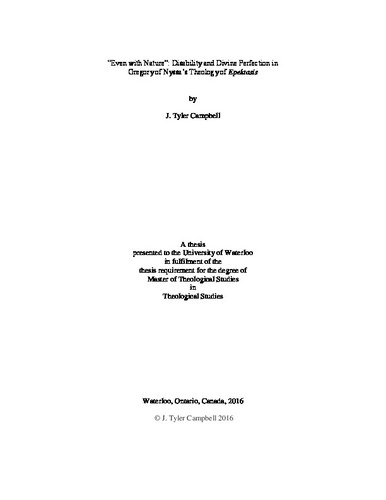| dc.contributor.author | Campbell, J. Tyler | |
| dc.date.accessioned | 2016-08-10 18:04:51 (GMT) | |
| dc.date.available | 2016-08-10 18:04:51 (GMT) | |
| dc.date.issued | 2016-08-10 | |
| dc.date.submitted | 2016-06-23 | |
| dc.identifier.uri | http://hdl.handle.net/10012/10619 | |
| dc.description.abstract | This thesis seeks to explore Gregory of Nyssa’s theology of epektasis, his view of the body as vessel of the mind/soul and medium for interpersonal communication and the implications for contemporary theological discussions of disability. Epektasis is commonly understood as the human being’s perpetual progress towards God. This perpetual progress is required for the flawed human being to better him/herself in hopes of drawing closer to the inexhaustible goodness of God. Although the study of epektasis most often focuses on the individual aspect, Gregory often emphasizes the relational importance of perpetual progress. Gregory’s depiction of the body as the medium for communications shows the way our bodies exist as both perceivers and expressers. Bodies are perceivers in that they are at all times taking in information and communicating with others, and expressers in the way they allow the bodies we come into contact with to see the content of both the mind and soul. Gregory suggests that the human communication that takes place between bodies has positive implications for the perpetual progress exhibited in epektasis. Human beings are able to learn from the bodies of more virtuous examples, ultimately imitating the virtue these models exhibit in their lives. For Gregory, this bodily communication is important because the human person is not classified by the ability to make rational decisions or to prove ideas with intellect. The notion that the body is able to communicate freely without reliance on intellect creates an accessible connection to contemporary considerations of disability.
The argument of the thesis proceeds as follows. Gregory’s thought is hierarchical with a perfect God at the top and humans striving upwards towards that perfection through epektasis. Gregory’s theology of virtuous models allows individuals to resist the assumption that disabled persons are located below abled persons on this hierarchy. His theology pushes us to recognize that fragility is constituent of God’s perfection. The role of disabled persons as models of virtue is one way that this fragile perfection is made known. Epektasis is the human attempt to strive toward a perfect union with God by way of communicating with others, especially virtuous models, through the human body. This communication takes place through sense experiences highlighted by philosophers concerned with the human body such as Maurice Merleau-Ponty. These conversations between Gregory and other thinkers add supplemental thought, explaining the ways Gregory’s theology accounts for the communicative nature on the surface and visceral levels of the body. The application of Gregory’s theology to contemporary thoughts on disability and the body is seen most clearly through an account of the author’s relationship with an individual with disabilities named Brooke. This application works to show the way Gregory’s theology of epektasis remains contemporarily relevant, and solidifies the argument of individuals with disabilities existing as exemplary models of virtue. | en |
| dc.language.iso | en | en |
| dc.publisher | University of Waterloo | en |
| dc.subject | Gregory | en |
| dc.subject | Nyssa | en |
| dc.subject | Theology | en |
| dc.title | "Even with Nature": Disability and Divine Perfection in Gregory of Nyssa's Theology of Epektasis | en |
| dc.type | Master Thesis | en |
| dc.pending | false | |
| uws-etd.degree.department | Conrad Grebel College Theological Studies | en |
| uws-etd.degree.discipline | Theological Studies (Conrad Grebel University College) | en |
| uws-etd.degree.grantor | University of Waterloo | en |
| uws-etd.degree | Master of Theological Studies | en |
| uws.contributor.advisor | Bechtel, Trevor | |
| uws.contributor.affiliation1 | Conrad Grebel University College | en |
| uws.published.city | Waterloo | en |
| uws.published.country | Canada | en |
| uws.published.province | Ontario | en |
| uws.typeOfResource | Text | en |
| uws.peerReviewStatus | Unreviewed | en |
| uws.scholarLevel | Graduate | en |

